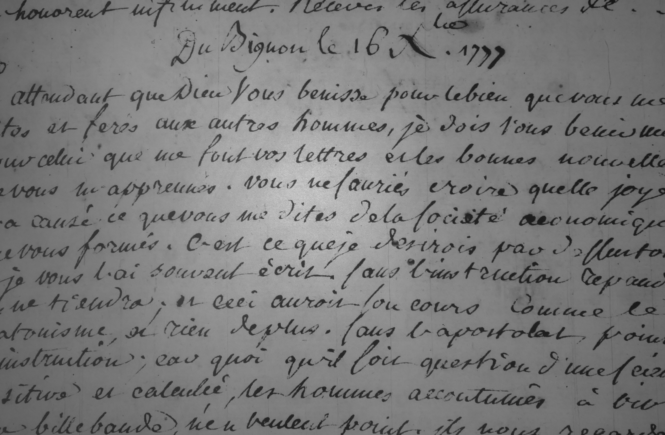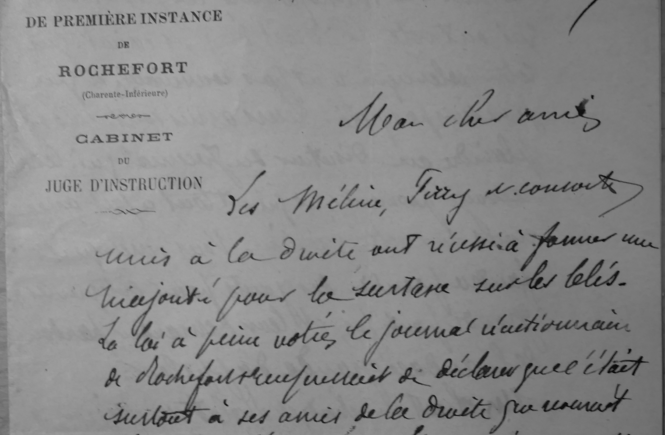1777 — THE POOR KNOWLEDGE
OF QUESNAY’S TABLEAU ÉCONOMIQUE
AMONG FELLOW PHYSIOCRATS
Letter from the marquis de Mirabeau to C. R. de Butré
16 december 1777
[Bibliothèque de l’Arsenal, Ms. 12101,
Suite de la correspondance de Bade, f°. 9-20.]
From Bignon, 16 december 1777
While waiting for God to bless you for the good you do to me and will do to you fellow men, I must bless you for the pleasure your letters give me and the good news you are thereby announcing. You will not believe what joy has caused me the hearing of your creation of an economic society. This is what I had wanted the most, and I have often mentioned it in my letters. Without widespread education, nothing will stand; our science will have a course similar to platonism, and nothing more. There is no instruction possible without apostolate, because although we are dealing with a positive and calculated science, men are accustomed to living inadvertently and therefore do not want this. They regard us as having taken as our motto this verse of the psalm Esurientes implevit bonis et divites dimisit inanes[1].You carry the torch in the midst of a gathering which is multiplying. Until they see more clearly, all of them, or at least the active members, please consider that it is your greatest interest to extend it; this science is made of the heart and soul of his apostles, and it is necessarily so. However, this is not precisely what makes me so happy; it is that you have considered the knowledge of the economic table[2]to be the necessary condition for your initiation. This is what I thought I was alone to feel necessary, and what I had never expected to see during the painful days of my life.
Since I was introduced to the knowledge of the economic table and became like the guardian and custodian of the sacred fire, all my work was devoted to the duty of making it known. The last part of the Ami des Hommes[3]contains my first explanation of it, made from the one of the doctor, who had already said everything in essence. The Théorie de l’Impôt[4], a work written in special circumstances, but more apt than any other to encourage young and old alike to further examination, authenticated the first results. It was indeed what most conveyed opinions and made the main part of my reputation, whose only value is to help in the promotion of our science. From this moment on, the success of the book made me feel it was my duty to no longer print on the roofs, and all the work devoted to laying out the foundations was aimed at basing them on the economic table. The Philosophie rurale[5], the greatest of all, is nothing more than an explanation of the table through an elucidation of its principles, and of its results, through an application of its calculations. It was therefore my second explanation. The Éléments de la Philosophie rurale[6], which is only an abridged version of the later one, and which contains its entire substance, always following the order of my chapters indicated at the head of the table as the objects to be considered, is the third. The Précis de l’ordre légal[7]contains two other more abridged explanations, but where one can find everything. These two are the précis itself, and my fourth explanation. Then we have the preliminary speech of this small work, a masterpiece where I break down the composition of the table: fifth explanation. If you are willing to reread it, you will see like me that one has to be dying through the torment of a long and slow suffocation and the contraction of an impatient and strong soul, as I was then, to make this piece in a single stroke. Five explanations, then, and that is really all I could do for this item. Surely the third part of the Économiques[8]can also be taken for an elucidation of the table, since I used almost all of this part for this end, and made to myself all the ordinary and possible objections against this alleged hieroglyph, which are answered and discussed in great detail, as well as the reasons for its need. The same could be said of the fourth part of the same work, since the six dialogues that it contains bear as their title the last six objects to be considered, but, considered as such, all that has been written and will ever be written on this science, will always come back to the table, as its very cornerstone.
My efforts in this regard have not been absolutely about the present. Much too impatient by nature when it comes to the current affairs and details, I do not carry this tiring vice in my judgments and forecasts in this regard. I know that according to nature, which is the sole rule of all that is good, everything has its interstices, its time and its season. Everywhere and always I see men in a hurry to collect without sowing or waiting, wanting to separate the attraction coming from need, this fruit of culture, with the enjoyment derived from work. Although this comparison may be improper, I see that today in Christianity one wants to detach morality from the dogma to whom we owe it, that one seeks to assimilate Socrates and Confucius to our divine teacher. One therefore refuses to see that Socrates, who has no mouthpiece but Plato, allows, among other plagues of the republic, the community of women; that Confucius still allows the plurality of them, and however elevated he may be with his virtues, above the prejudices of his age and of his nation, he nevertheless praises the vengeance of a crime up to the ninth generation: and this vengeance is not like that which is threatened by goodness itself, placed in the hands of God, who would not be God if he did not punish, but in the hands of men. In short, once endowed with the treasures of perfect morality, one would like to ignore its author and its basis, because it astonishes our minds, it apparently hinders our willpower, while in fact it alone can give us its true and real use and the unique means of essentially and usefully having a willpower. Therefore, I must have suspected that once the principles and results of the earthly science par excellence had been grasped, the table would be forgotten, neglected and even rejected as useless, tiring, incomplete, and hieroglyphic.
What I am saying here, I have seen it happening, even during my time and among our students, who, being the first, must have been the most zealous by right and custom; and this, at a time when the doctor was still alive, when the discussions opened the soul and the heart of his disciples, and when reverence should have increased prevention. Dupont understands the table well and can even apply it to all cases of accounting and administrative operations, with the exception of rural activities for which he does not have the exact data, and which are nevertheless the key to everything. However, he can be regarded as a true scholar in regard to the table. La Rivière has no clue about it. He was in a hurry to use and enjoy. He even wanted to strip the doctor, who was doing it enough by himself, and then disavow him. He would have gone as far as to turn his back on his father and mother, said the doctor. Thus, although he has written under his direction and in his entresol a great work[9]on the totality of science applied to practice, and that he can still write some very good other ones, he possesses the results and most of the principles, but he is not and will never be a literate economist. The same can be said of Turgot, who moreover adds errors to what he knows and disavow the master. Abbot Baudeau understand everything in one stroke and he has understood the table well; but he always groped it, tried it, found it incomplete, and the venerable doctor feared him very much for his heresies. He wanted to write an explanation of the table for the Éphémérides, in his familiar, cut-out and certainly very lucid way, and he left it, out of inconstancy, it is true, being incapable of undertaking a continuous and sustained work; but he did well to leave it there, because he was missing it. [10] Abbot Roubaud, a very skilled economist by the way, never set his eyes on the table. The righteousness of his mind is so great, and besides, his head is so abundant and so vigorous, that he does not need the table to think straight. The doctor said, I do not know who taught this abbot Roubaud, but there is never any heresy with him. Your faithful Gébelin[11]is an economist of heart and soul, but not of knowledge; he is completely devoted to our principles, and holds the results as being positively sure, and as being facts, but this respectable scholar does not leave the career of his erudition, which he grasps and embraces with the help of the torch of our principles, which brings him back to nature and thus gives him the surest way to find and collect the primitive world [12], to stitch it up with ours and to teach us that the circle of errors is not as wide and varied as we had been led to believe. Among the enlightened public there is a great number of disciples who are good economists, but none have studied the table. Thus strangers who have only read my books and the Éphémérides, may have become perfectly skilled in decisive judicial matters, and even in teaching; but neither of them can calculate the consequences of a faulty public operation. I believe that there is none, if we except our great prince[13], who knows how to handle and decompose the table. I myself, who have explained it so much, certainly understand it. It is not a difficult thing, and it is only difficult for those who suffer from impatience and dissipation; I break it down, but I would not apply it. I know of only one man who is excellent in this, and whose work will make it known what it is to apply the table.
Name me this man, Sir, if you know him[14]; but above all ask him to keep repeating to his disciples, colleagues and associates, on my behalf, I who is walking my way, but who will remain as having been the trumpet of science, the first voice that cried in the desert, keep repeating that when I first wanted to make the table the foundation of everything, the deference for my master, whom I always considered with the highest admiration that the Chinese can have for a man, could not have alone given me so much stubbornness and so much zeal. If I tried so hard to ensure the table will forever receive the veneration of enlightened posterity, it was because I thought the time would come when the science would be that of human life, taught to all men, to each according to its abilities, the introduction to life, the guide and the rallying point of general opinion, and consequently the indispensable and true science of government; that the result, however, of this regeneration, which is the only way to make societies stable and religiously constituted, would involve bringing nations back to family spirit, and politics to the art of making government paternal; that everything required for this to happen, in details, which all come down to taxation, would constantly require good accounting, so that men can always be good friends[15]: that these accounts could only be made, remade and perpetuated by the table, and that when the religion of the just and the unjust, the puerile instruction of simple rights and duties, their advances, their result, the private property admitted by everyone, as can be the admission of a God and a father, and by the same means used by those who can neither feel nor see, when all of this would form the general opinion, the belief of the people in his strength, as well as that of the law and the sovereign, it would then become necessary that scholars in this questions shall be leading, or at least closely following, and the necessary companions of the people who are said to be incumbent, and the heads of nations, not to speak about the need that landowners and other prominent figures in the State could have for their own business. That however, for it to be so, it would be necessary that one feels the necessity of this study and the profit which one derives from it, and that consequently this science was the object of emulation and rewards, of public esteem and the veneration of peoples. Therefore, the table would be necessary to some, honorable to others, venerable to the people and the point of universal rallying. Without the table, on the contrary, soon come the heresies in subtleties, the researches, and soon also the error for some, the hypothesis and the verbiage, useless and without exact application, for the others, and finally the falling into oblivion of a morality that has become metaphysical and almost arbitrary in the eyes of the people. At that time I believed this to be inevitable, and I still believe it up to this day…
————————
[1]He has filled the hungry with good things, and the rich He has sent away empty. (Gospel of Luke, 1, 53)
[2]The famous Tableau économique produced by Quesnay in december 1758.
[3]Following the book published under the same title in 1756, Mirabeau later produced a few additional volumes. In volume VI, published in june 1760, he inserted Quesnay’s Tableau économique along with explanations of his own.
[4]A book by Mirabeau, published in 1760.
[9]L’ordre naturel et essentiel des sociétés politiques (1767).
[10]Baudeau still published in 1776 a book edition of these articles from 1767-68.
[11]Antoine Court de Gébelin, one of Butré’s personal friend.
[12]From the title of one of his books: Le Monde primitif, analysé et comparé avec le monde moderne, published in several volumes, beginning in 1773.
[15]Mirabeau is using an idiomatic expression which means that good accounts make for good friends (les bons comptes font les bons amis).



